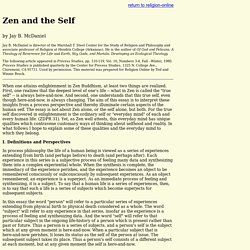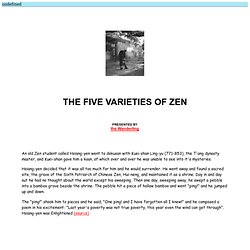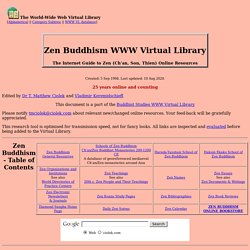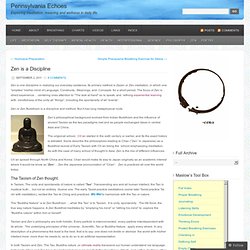

Manual zen. Religions - Buddhism: Zen Buddhism. Zen and the Self. When one attains enlightenment in Zen Buddhism, at least two things are realized.

First, one realizes that the deepest level of one’s life -- what in Zen is called the "true self" -- is always here-and-now. And second, one understands that this true self, even though here-and-now, is always changing. The aim of this essay is to interpret these insights from a process perspective and thereby illuminate certain aspects of the human self. The essay is not about Zen alone, or the self alone, but both. For the true self discovered in enlightenment is the ordinary self or "everyday mind" of each and every human life. I. In process philosophy the life of a human being is viewed as a series of experiences extending from birth (and perhaps before) to death (and perhaps after). In this essay the word "person" will refer to a particular series of experiences extending from physical birth to physical death considered as a whole.
II. III. Still the word "in" must be interpreted.
Rinsai. Seon. Soto. Thein. The Five Varieties of Zen. An old Zen student called Hsiang-yen went to dokusan with Kuei-shan Ling-yu (771-853), the T'ang dynasty master, and Kuei-shan gave him a koan, of which over and over he was unable to see into it's mysteries.

Hsiang-yen decided that it was all too much for him and he would surrender. He went away and found a sacred site, the grave of the Sixth Patriarch of Chinese Zen, Hui-neng, and maintained it as a shrine. Day in and day out he had no thought about the world except his sweeping. Then one day, sweeping away, he swept a pebble into a bamboo grove beside the shrine. The pebble hit a piece of hollow bamboo and went "ping! " Among the various types of Zen presented to the people of today there are some which are profound and some shallow, some that lead to Enlightenment and some that do not. (PLEASE CLICK) GASSHO(PLEASE CLICK)CLICK HERE FOR ENLIGHTENMENT ON THE RAZOR'S EDGE Source: "The Three Pillars of Zen", Kapleau, Roshi Phillip, pgs.44-52.
Zen Buddhism. Zen Buddhism WWW Virtual Library. Created: 5 Sep 1994.

Last updated: 10 Aug 2020. 25 years online and counting Edited by Dr T. Matthew Ciolek and Vladimir Keremidschieff. This document is a part of the Buddhist Studies WWW Virtual Library Please notify tmciolek@ciolek.com about relevant new/changed online resources. This research tool is optimised for transmission speed, not for fancy looks. Updates, additions and corrections to this site have been kindly provided by: Nicholas H. Visitors to www.ciolek.com since 08 May 1997. This page was originally established and maintained from Sep 1994 to Apr 1996 by Dr T. Maintainer: Dr T. Copyright (c) 1994-present by T. URL [See also:Aboriginal Studies || Asia Search Engines || Buddhist Studies || Ciolek - Research Papers || Global Timeline || || Information Quality || Tibetan Studies || Trade Routes || Zen Buddhism ] Home page. Collecting the Art of Zen. Zen Gift Ideas, Zen art, Meditation, Zen Meditation, Buddhism, Buddhist Quotes, Taoism, Fine Art Prints, Unusual Gift Ideas, True Blue Designs, Zen, Buddhist, and Taoist classic writings and teachings - Daily Zen - Epic.
Zen is a Discipline « Pennsylvania Echoes - Epic. Zen is one discipline in realizing our everyday existence, Its primary method is Zazen or Zen mediation, in which one “empties” his/her mind of Language, Constructs, Meanings, and Concepts for a short period.

The focus of Zen is direct experience… centering ones attention to “The task at hand” so to speak, and refining experiential learning with mindfulness of the unity all “things”, including the spontaneity of all “events”. Zen or Zen Buddhism is a discipline and method. But it has long metaphysical roots. Zen’s philosophical background evolved from Indian Buddhism and the influence of ancient Taoism as the two paradigms met and as people exchanged ideas in central Asia and China. The origional school, Ch’an started in the sixth century or earlier, and Its the exact history is debated. Ch’an spread through North China and Korea. The Taoism of Zen thought. In Taoism, The unity and spontaneity of nature is called “Tao“. The “Buddha Nature” is to Zen Buddhism ….what ‘the Tao” is to Taoism. View forum - Welcome to Zen Forum International. Zen.